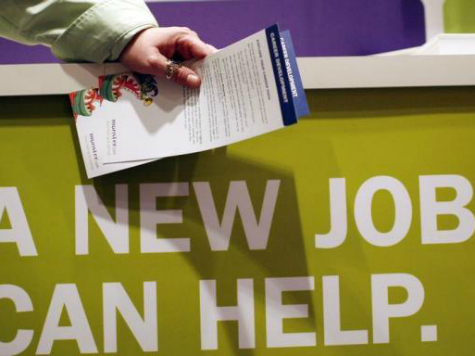The economy grew 2.6 percent in the fourth quarter–hardly the 4 to 5 percent needed to provide enough jobs and restore housing prices to pre-recession levels.
Throughout 2013, higher taxes on all income classes–President Obama’s levies on the wealthy, higher local taxes on the middle class, and reinstatement of social security taxes on lower income workers–depressed consumer spending.
Consumers coped by saving less, but that dampened winter spending, and first quarter is expected to register at about 2 percent. Activity should pick up this spring to about 3 percent the second half of the year.
Jobs Market
The unemployment rate has become a meaningless statistic for evaluating the economic recovery, because so many discouraged Americans have quit seeking jobs and are not counted in jobless statistics. If the same percentage of adults were active today as when the recovery began, the unemployment rate would be 9.6 percent.
Baby boomer retirements are not driving down adult labor force participation. Over the last decade, to compensate for shrinking pensions, the percentage of Americans ages 65 to 69 working has risen from 26.8 to 30.8 percent.
Going forward, the economy will create about 200,000 jobs each month, hardly the 350,000 needed to raise employment to pre-recession levels.
Housing Prices
Homes have recovered 43 percent of the value lost during the financial crisis. Speculators scooped up bargain priced foreclosures, but that activity is abating.
More young adults are leaving their parents’ nests. Housing starts should rise above 1 million for the first time since 2007, still less than half the pre-crisis peak.
Comparing household incomes with home prices, homes look quite affordable, but first time buyers are terribly burdened by student debt. Coping with less job security, many are opting to rent apartments.
Those are cheaper to build, result in fewer spin off purchases for improvements, and help lift the economy and employment less than single unit dwellings. That’s the hangover from young folks borrowing too much to obtain questionably useful college diplomas.
Stocks
The bull market is five years old, and many analysts believe it is time to cash out some profits. Price earnings ratios are frothy, especially considering weak domestic growth.
However, the Standard & Poor’s 500 earn much of their profits abroad. Since 2000, corporate earnings are up 440 percent, while stocks increased only 21 percent–much less than inflation at 43 percent or housing values at 62 percent.
Young folks in apartments should put $50 a month, or whatever they can spare, in an S&P index fund. They will be thankful when their grey hair arrives.
Breaking the Funk
Years of huge federal deficits make fiscal policy a spent force, and the Federal Reserve can’t do much more to spur growth. The real remedies lie in boosting individual industries, regulatory reform, and better competing in foreign markets.
Increased onshore oil and gas production has dramatically reduced oil imports. Remaining foreign purchases could be eliminated by lifting excessive environmental regulations that ban drilling off the Atlantic and Pacific Coasts and parts of the Gulf.
More meddlesome to growth is the continuing surge of Chinese and Japanese imports made artificially cheap by Beijing and Tokyo’s manipulation of yuan and yen exchange rates. Economists across the political spectrum have suggested remedies, but ideologues on both the right and left in Congress and administration eschew practical solutions.
Credit to businesses could be boosted, and capital markets made more supportive to growth, by scrapping most of Dodd-Frank, separating Wall Street financial houses from ordinary banking, and breaking up the biggest banks to achieve a balance between competition and regulation.
ObamaCare is raising the cost of health insurance, limiting the range of care choices, and creating an army of part-time workers as businesses seek to avoid burdensome mandates.
Republicans can’t come up with a viable alternative because they eschew foreign models that work–like those in Germany and Holland that recognize that markets alone can’t discipline health care costs and regulate prices.
More reliance on markets in banking, less in health care–that sounds like a prescription for moderation; something shrill voices on Capitol Hill and the White House can’t embrace.
Greek civilization flourished adhering to the Golden Mean–the middle between the two extremes–that is still where most solutions to our problems reside.
Peter Morici is an economist and professor at the University of Maryland Robert H. Smith School of Business and a widely published columnist. He tweets @pmorici1.

COMMENTS
Please let us know if you're having issues with commenting.